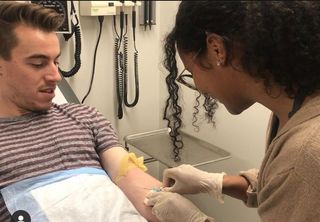The healthcare team is made up of much more than doctors and nurses. We introduced you to Medical Technologists, and now, we’re giving you a look into yet another amazing health care provider: the PA. Let’s talk to PA student Taneasha!
What’s your name and where are you from?
My name is Taneasha Muonio and I am from Minneapolis, MN.

What is a PA?
TM: A PA is a Physician Assistant, not physician’s assistant. The name is a misnomer since we are independent and work in collaboration with MD/DO, NP, CNMW, and other providers. The apostrophe adds ownership and we are not owned by anything…well maybe our debt 🥴. PAs are medical providers who see patients in all areas/specialties. The PA profession was created in 1965 after WWII in response to a shortage of medical care. There was a high demand but low supply of providers. There also was a high number of experienced medics from the war who were unemployed when they returned home. These medics were put on an accelerated medical education curriculum & 💥 you now have medical providers!
One of the most beautiful aspects of the PA career is that we were created in response to a high need for care and that continues to be reflected in how we are trained.
What do PAs do?
TM: PAs work in all areas of medicine and perform procedures, surgeries as first assistants, physical exams, testing, making clinical diagnoses & managing treatment plans. We are able to prescribe all medications & in several places be fully autonomous after a certain number of supervision hours.

What’s the degree program like?
TM: PAs complete an accelerated medical curriculum ranging from 2-3 years. This is after a bachelor’s degree and typically 500-2000 patient care hours in the field. Our formal medical training is typically only 5 months shorter than a DO/MD, but we do not complete a residency (you can if you want). We are trained as generalists and have horizontal mobility, meaning we can work in any specialty and more than one at a time! How cool!
That requires humility and being able to admit when you do not know. The lack of residency does not make us incompetent but our MD/DO counterparts have experience in things we do not and can COLLABORATE with us to meet our patients needs! We have to recertify every 10 years and accumulate continuing medical education hours every year.

Tell us about your journey to the Physician Assistant program.
TM: My journey consisted of going to Augsburg University and getting a B.S in Biopsychology. I also worked as a PCA, a DSP, a social work intern, and a substance use pain management intern to gather my patient care hours! I also was president of the Pan-African Student Union, started a STEM peer mentoring program, conducted biochemistry research, studied abroad in Germany, and did an internship at DMU medical school in Iowa. I also am a first generation high school and college graduate.
In my spare time I taught free Zumba and yoga to my community to improve health outcomes for Black people. It is my job to impact the social determinants of health for my patients outside of the office. For example, a medication for hypertension is only as good as the lifestyle changes patients make and have the resources to make. I chose to be a PA due to my call to action of serving my community. Black patients die at astronomically high rates of preventable disease due to lack of resources, bias, racism, and inherent prejudice weaved into the back bone of medicine, society, and culture. In addition 2.5% of PAs are Black which is not proportionate representation. Providers should match the patient population. I also love science and medicine and have always wanted to help people.
What are the prerequisites for being a PA?

TM: All schools vary a bit, but the core prerequisites are your Biology, chemistry, physics and psychology classes. In addition most schools require minimum 500 patient care hours, but competitive applicants have 2,000. Several school want varied extracurriculars and leadership opportunities.
If you make it to the interview, you are just as qualified as everyone else academically, so beef up your resume with things that make you well rounded and unique. One of my favorites things to talk about in my interview was how I took a knitting art class in undergrad and still knit!
What is the program like?
Whew! What a loaded question. First year at my institution is 40 hours a week of lecture and then studying on my own time with exams biweekly. We are system based so we move in system blocks, Cardiology, hematology, dermatology, psychiatry, etc. We also had labs, practicals, physical exam tests, had to write a master’s thesis paper, and prepare for end of academic phases summative exams. I’ve never worked as hard as I did during didactic phase in my life!
I am in my clinical phase currently so I have a rotation for 4-5 weeks and will then take an end of rotation exam before advancing to my next one. COVID has caused several delays and we are now on an uncertain path so the clinical phase is currently longer than expected which is hard some days.

I’m not sure what I want to be. Why should I choose PA?
I cannot tell you to choose PA. I believe that you should only do it if you research and try everything else and your heart and spirit still leads you here. The education journey is difficult and very expensive and the responsibility is the biggest daily price. If you are debating between MD and PA, the lens I can lend is I choose PA because of time; schooling is 27 months opposed to 4 years. In terms of money, it is cheaper than medical school. As for lateral mobility, I like the idea of being able to switch specialties, and the collaborative health care is a plus as I like the built in collaboration of the PA profession with the ability to practice autonomously. PAs practice in all areas including surgery which is exciting and fun!
Do you have any advice for persons looking to come into the PA profession?
RESEARCH THE PROFESSION FIRST! Make sure you want to do it because its apart of your soul given purpose, not because society or your family told you to.
Be kind to yourself and patient. You will make mistakes; you will fail some days, you will not be perfect and that’s okay. You just need to show up with a heart posture that is pure and dedicated to the mission. Patients want the PA that hears them, not the PA that can recite the entire medical textbook, but silences them while doing it. Use your resources and community.
All in all, work hard, follow your heart and if you want to be a PA, do it!

*******************************************************************************************************************************
Interested in being a PA? If you have any specific questions, send a DM @taneashathePA! She’d be happy to help! Let us know in the comments what other allied health profession you’d like featured!





